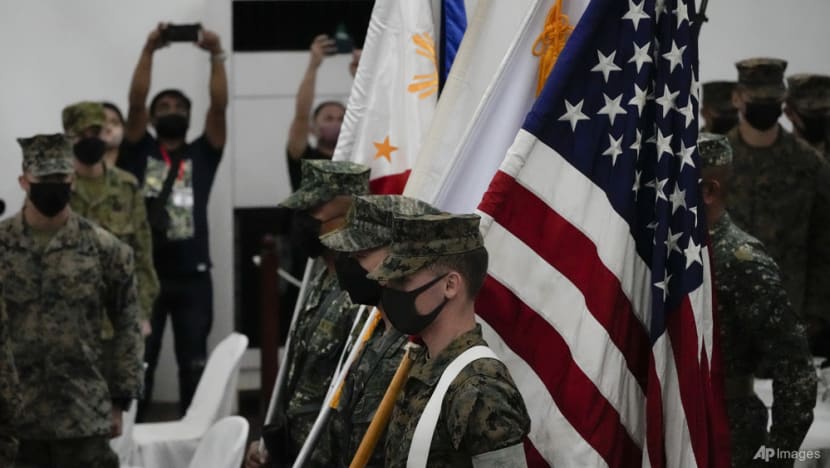Commentary: Call by China foreign minister for ASEAN to stay clear of power rivalry highlights tricky balancing act for region
Some Southeast Asian leaders have said they will not take sides in the US-China conflict - but if pushed, it is not unlikely they will do so according to national interests, says Oh Ei Sun.

SHANGHAI: At a press conference on the sidelines of China’s annual “two sessions”, a question posed to Chinese Foreign Minister Qin Gang seemed to channel Southeast Asian regional sentiments.
The question postulated that as China’s economy faces growing downward pressure, regional countries are finding it difficult to rely on the US for security guarantees, and on China for economic development.
And according to media reports, Qin was equally blunt in answering, advising that Association of Southeast Asian Nations (ASEAN) should stay clear of any power rivalry between big countries. He noted that leaders of regional countries have stated that ASEAN should not be a proxy for any party.
In particular, Qin pointed out that the Indo-Pacific strategy by the US is an attempt to form “exclusive blocs” that hurt the interests of regional countries, adding that any attempt to encircle China is bound to fail.
INTENSIFYING US-CHINA TENSIONS
These strong remarks from China’s top diplomat should first and foremost be read in the larger context of intensifying tensions between China and the US.
As China grew in recent years to be more assertive on the world stage and became less reticent on promoting its values globally, successive American administrations responded with increasingly confrontational postures. This in turn elicited strong responses from a more self-confident China, and the vicious adversarial cycle between the two superpowers spiralled ever downward.
A plethora of sanctions and trade barriers have been placed by the US, prompted by mounting bipartisan congressional support for tougher action against Chinese entities.
The crossing and eventual shooting down of a Chinese balloon over American territory was but the latest manifestation of distrust between the two competing global powers.
Indeed, as Qin warned in the same press conference, there would be “catastrophic consequences” if the US did not cease its containment of China.
With China considering the US-led Indo-Pacific strategy as yet another attempt to suppress its rapid rise, the adoption and widespread usage by many ASEAN member states and ASEAN itself of Indo-Pacific lingo in security-related discourse is not viewed positively by Beijing.
In 2021, ASEAN even put out its own “Outlook on the Indo-Pacific” document, which focused deliberately on the more non-security aspects of regional cooperation.
But perhaps that was not enough to assuage China, as ASEAN deigning to respond to the US Indo-Pacific strategy might be viewed as an affront.
BITING THE HAND THAT FEEDS
In addition, China increasingly does not take kindly to ASEAN’s traditional stance of balancing American military might against Chinese economic prowess in the region.
For example, around the same time Philippine President Ferdinand “Bongbong” Marcos Jr visited China and secured US$22.8 billion in investment pledges, it was announced that the Philippines would expand US access to four of its military bases: Three facing north towards Taiwan and one near the disputed Spratly Islands in the South China Sea.
In China, where a modern orthodox saying goes along the lines of one should not bite the hand that feeds them, this is likely considered a double-crossing act on the Philippines’ part. There have since been more frequent reports of run-ins between Chinese and Philippine vessels in disputed South China Sea maritime territories.
China might thus feel a need to caution its regional neighbours against taking the US side in the escalating confrontation between the two superpowers.
WILL ASEAN COUNTRIES BE PUSHED TO CHOOSE A SIDE?
From ASEAN’s perspective, remarks by some ASEAN leaders suggesting they will not take sides should be understood in the sense that they would not proactively seek to do so.
However, if regional countries are indeed pushed by either or both of the major powers to choose a side, it is not unlikely they will do so according to their respective national interests.
Scarcely could countries anywhere around the world remain permanently neutral unless they are armed to the teeth and untouchable even to the big powers. Otherwise many countries, especially middle powers in Southeast Asia, would have to engage in the precarious game of balancing one partner against another.
In addition, the US military presence in Southeast Asia should not be viewed from an exclusively US-versus-China perspective only. It also concerns intra-ASEAN dynamics, where the US military has a stabilising effect among a number of ASEAN countries which might otherwise see higher levels of enmity.
And this regional stabilising role is one which most ASEAN countries do not view China as being ready to assume, perhaps at least not until substantial progress has been made in addressing the South China Sea territorial disputes between China and ASEAN claimants.
In summary, there is perhaps room for more pragmatic dialogues between China and ASEAN, such that less misunderstanding of each other’s intentions and fewer miscalculations of their own respective actions could be achieved.
ASEAN countries may not like to be pawns as major powers slug it out among themselves in the region and beyond. But perhaps more tellingly, ASEAN countries do not want to have their backs pushed against the wall, at the brink of war.
Oh Ei Sun is a senior fellow with the Singapore Institute of International Affairs.




















